A Teaching on Impermanence For the Young and Old
advertisement
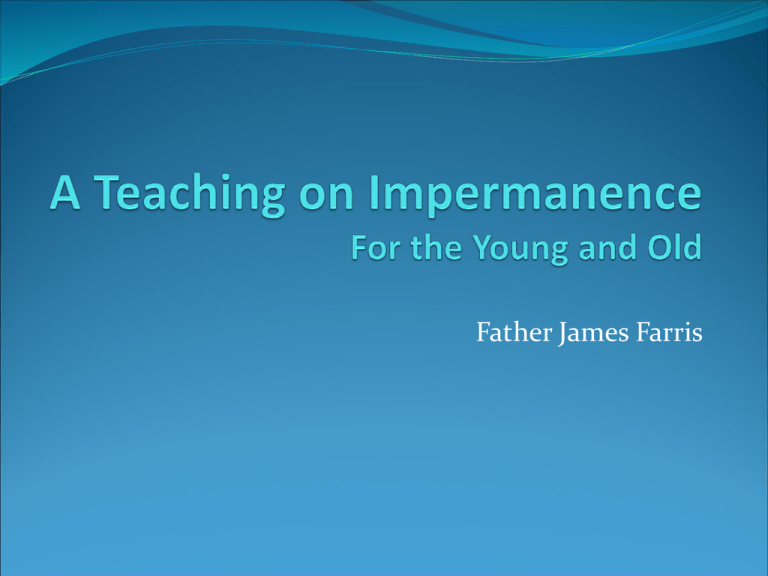
Father James Farris We often think of impermanence as a Buddhist term. Yet, Jesus often taught about impermanence. If even the smallest things are beyond your control, why are you anxious about the rest? Notice how the flowers grow…not even Solomon in all his splendor was dressed like one of them. If God so clothes the grass in the field that grows today and is thrown into the oven tomorrow, will he not much more provide for you, O you of little faith? As for you, do not seek what you are to eat and what you are to drink, and do not worry anymore …For where your treasure is, there also will your heart be. - From Luke 12 Some may say that young people cannot relate to the notion of “impermanence.” It may turn out that this is one of their most useful words – as our nation faces economic woes for the next few years. The most important thing about the word is the idea that people are not “fixed” identities. The Buddhists would say that there is no “self.” A useful interpretation of this teaching is that each person is a process – like waves arising in the sea. As each wave crashes on the beach, it is helpful to remember that it always remained part of the ocean. Where did that energy go? What is a wave? Jesus lived in impermanence As they were proceeding on their journey someone said to him, “I will follow you wherever you go.” Jesus answered him, “Foxes have dens and birds of the sky have nests, but the Son of Man has nowhere to rest his head” (Luke 9:57-58). In the West, we have been plagued by the “body-soul” perspective, contrary to the “body-soul-spirit” concept of Saint Paul. This three-part understanding of Saint Paul reflects other great religious traditions of the world. We can use body-soul-spirit to better imagine the relationship between God and self – between the change of the moment and the changeless that we call “God.” In Yoga philosophy, the soul is comprised of jiva and atman. Jiva is the last remaining segment of individual personality, and atman is a pure reflection of Brahman – existence itself (what Christians might describe as “the all in all”) While jiva-atman is not Christian doctrine, it is a useful image for Christians because many yogis believe that we retain something of individual consciousness after death – a belief that Christians share. Two points about identity that relate to impermanence: 1Corinthians 15:28 says: When everything is subjected to him, then the Son himself will (also) be subjected to the one who subjected everything to him, so that God may be all in all. As Christians, we believe that we are on a journey into God – when we shall be one with God. This was the teaching of Saint Bonaventure – a great Catholic saint. We are like the drop of water added to the wine during the Eucharist – becoming so imbued with Christ that we are no longer two. “No longer two” retains the mystery of identity – somehow one with God, but beyond our understanding of that oneness. By the mingling of this water and wine may we come to share in the divinity of Christ, who humbled himself to share in our humanity. - From the Eucharistic liturgy People young and old and old can avoid a lot of pain in their lives by adopting an approach of impermanence. Life is full of both success and disappointment. To become adept at “adaptation,” we need to realize that neither pain nor pleasure lasts. This is the teaching of Saint Teresa of Avila – the great Catholic mystic. Remember: neither one is permanent. This is the impermanence of the surfer –responsive to the changes of the sea. The mystics compare this “impermanence” to the responsiveness of lovers. It is not something fixed and unmoving, but is fluid, reacting to the moment – to changes all around. It is “interdependent” with all else. As a virtue, the ability to flow with of impermanence can be described as “skillfulness.” Jesus taught his followers to live in this sense of impermanence. He said to all who seek his path of peace: The hour is coming, and is now here, when true worshipers will worship the Father in Spirit and truth… (John 4:23) We who follow Jesus are called to live like the guests at a wedding who await the arrival of the bride and groom – ready to respond to the next moment – not simply living by rules and regulations, but “by the Spirit” who calls us in each present moment. Then the kingdom of heaven will be like ten maidens who took their lamps and went out to meet the bridegroom…Since the bridegroom was long delayed, they all became drowsy and fell asleep. ..At midnight, there was a cry, 'Behold, the bridegroom! Come out to meet him! - From Matthew 25 Then “impermanence” is not a shadow or a threat, but the promise of “now,” renewed with every breath we take. This is one meaning of our prayer, taught by Jesus: “…Thy kingdom come...” and “Give us this day our daily bread…”
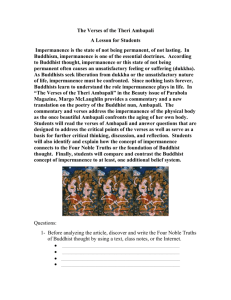



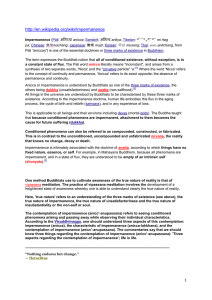



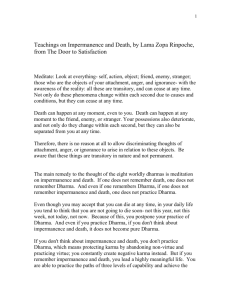

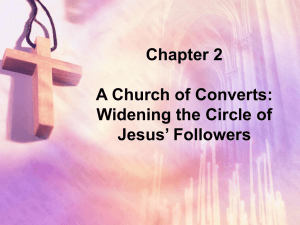

![A study of Sampajañña in Pali Literature[*] There are several](http://s3.studylib.net/store/data/007435383_1-b2e226a95e895f8d2308fd5f0500e15e-300x300.png)